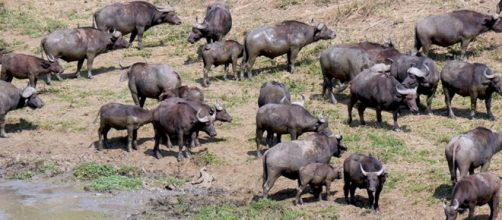Scientist Roger Porter of the Global Environmental Trust (GET) has stated that the proposed coal mining on the border of the wilderness area of Hluhluwe-iMfolozi will have “irreversible and irreparable consequences....to the environment”.
The Hluhluwe-iMfolozi Reserve is the oldest nature reserve in Africa and is the only KwaZulu reserve that contains all of the big five. Originally, a Royal Hunting Ground for the Zulu Kingdom, it was declared a nature reserve in 1895.
70% of the reserve is set aside as a wilderness area, where the public may only access it on guided walks.
This was the vision of one of the early rangers in the reserve, the late Dr Ian Player, founder of the Wilderness Leadership School that has operated in the reserve for over fifty years.
Dr Ian Player said of this reserve, “iMfolozi casts a spell over every man who has ever worked there…it became a place with a distinct soul”. Dr Player passed away on 30 November 2014, still fighting for his beloved wilderness as he strongly opposed the development of the mine.
The reserve was the birthplace of the fight to save the rhino from extinction. As far back as the late 1950’s, rangers were working towards the conservation of the white rhino. Their success has unfortunately made the reserve a target for poachers in recent years.
Now there is an even greater threat to the reserve – that of human exploitation of resources at the cost of an intact eco-system.
The proposed open-cast Fuleni Mine will operate on the border of the reserve. It is expected to have a life of 32 years. A coalition of eight NGOs and a host of international organisations are opposing the project. The iMfolozi Community and Wilderness Alliance (ICWA) is leading the way. Campaign director Sheila Berry said that there will be a “catastrophic impact” on the wilderness status of the reserve and pointed out that it would "severely affect community welfare."
The local community is sceptical that the proposed job creation will make up for the fact that about 16000 people from 7 local communities will have to move away from their traditional homes.
Roger Porter points out that incredibly, "Ibutho Coal has conceded that mining will destroy the wilderness status of iMfolozi." Their offhand attitude about the environment is exacerbated by their careless proposal to buy up a few pieces of land to make another wilderness. Porter says, “It’s quite staggering …bearing in mind the historical and cultural heritage of this untouched and internationally prized natural area.”
In May 2015, the Natal Observer reported that an amended final scoping report had failed to address issues such as a buffer between the protected area and had not covered sufficient due diligence with respect to local stakeholders. However, despite this the Department of Economic Development, Tourism, and Environmental Affairs had accepted the report.
Ezemvelo KZN Wildlife, formerly The Natal Parks Board have managed the uMfolozi-Hluhluwe Reserve for years. They have come out strongly against the mine saying, “It would be a travesty.”
South Africans are not giving in easily and their Save our Wilderness Campaign is fighting to the last to prevent this travesty from happening.
The South African government must face their responsibilities and do the right thing concerning this mine. They have an obligation to protect the natural heritage of the country and to show the rest of the world that they are sufficiently mature to manage the environment in a responsible manner.
South Africa’s proposed biodiversity strategy 2015
Rwanda proves that a green economy is within reach of all nations

